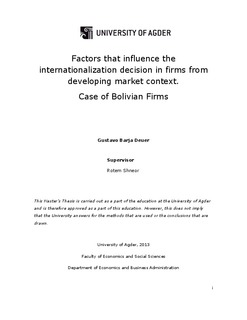| dc.description.abstract | This study challenges a very relevant issue within today´s internationalization context. We studied the factors that influence the internationalization decision of firms from developing market context. This qualitative case study approach was chosen as a way to explore the least studied context of firms from developing countries.
We decided to look into the factors that have influenced the internationalization decisions in firms from developing market context because the theories of internationalization seem to mostly focus on firms from developed market context, so we chose three firms from a developing country context to find these factors in order to expand our understanding and potentially extend the few existing theories. This has been done by looking into related literature of internationalization. Three major approaches, selected from the classical writings in their respected areas in the international business literature, have been reviewed: 1. The Uppsula Internationalization Model (U-M) 2. The Born Global Approach 3. The Network Approach.
Also, we performed an empirical analysis of three firms in Bolivia:
1. Sombreros Chuquisaca (Sucre –Bolivia)
2. Friccion S.A (Santa Cruz – Bolivia)
3. SAO- VBL (Santa Cruz – Bolivia)
We chose Bolivia because it is a good example of a developing country, and hence suitable for conducting this type of research, and finally, we made a critical discussion between theoretical and empirical findings.
iv
Our results suggest two major findings: First, that firms from a developing country context first enter markets with lower quality demands and then gradually improve quality and enter markets with higher quality demands, and; Second, that firms from a developing country context internationalize based on domestic cost advantages versus domestic firms elsewhere. They go where there is little competition in the market, and the domestic players are weak or declining because of higher cost structure. Finally, the end result and contribution is a fine tuned model/list of propositions concerning factors influencing internationalization decision making in firms from developing market contexts.
We further conclude that substantial research and theory building is required, not only in Bolivia but also in other developing economies so that we begin to gain a knowledgeable understanding of the opportunities and challenges that these firms from developing market context face in the global economy. | no_NO |
